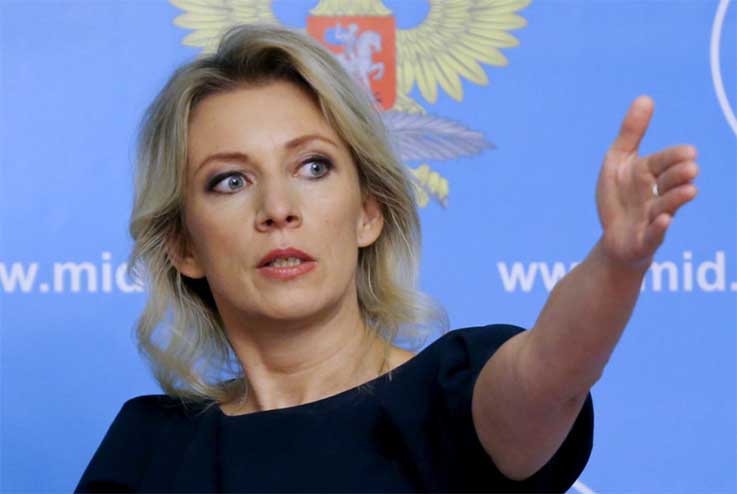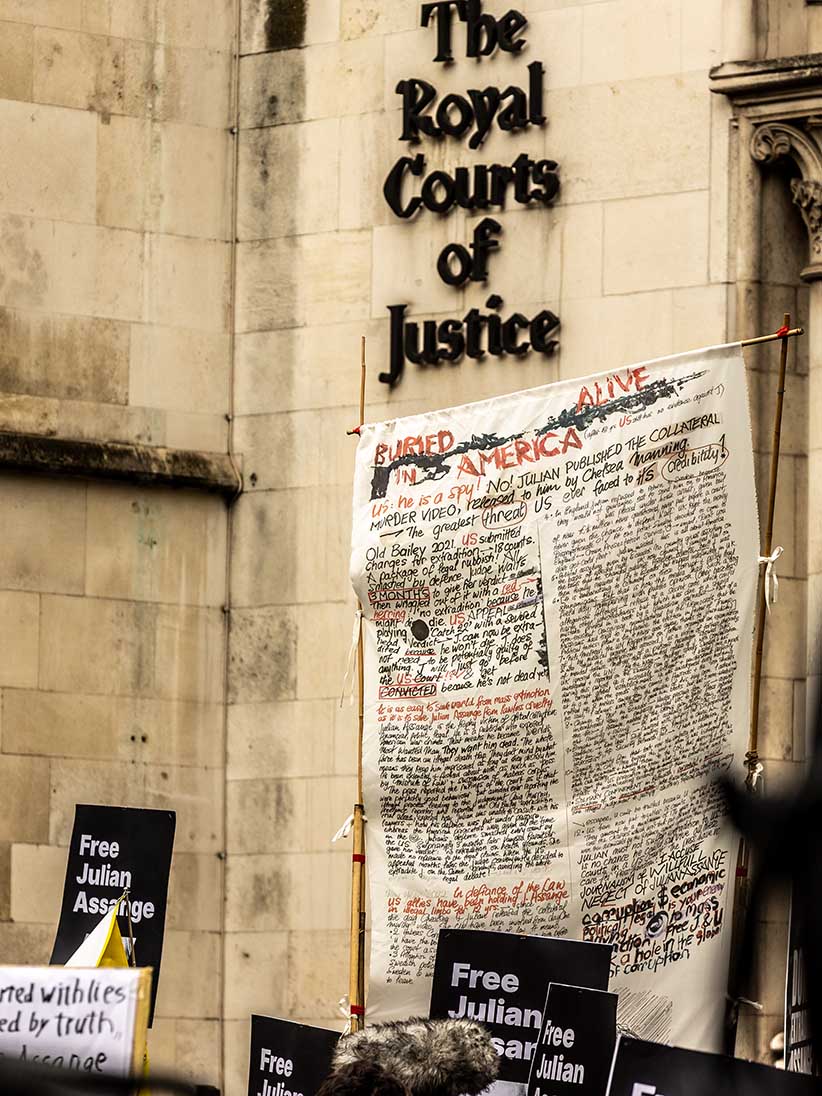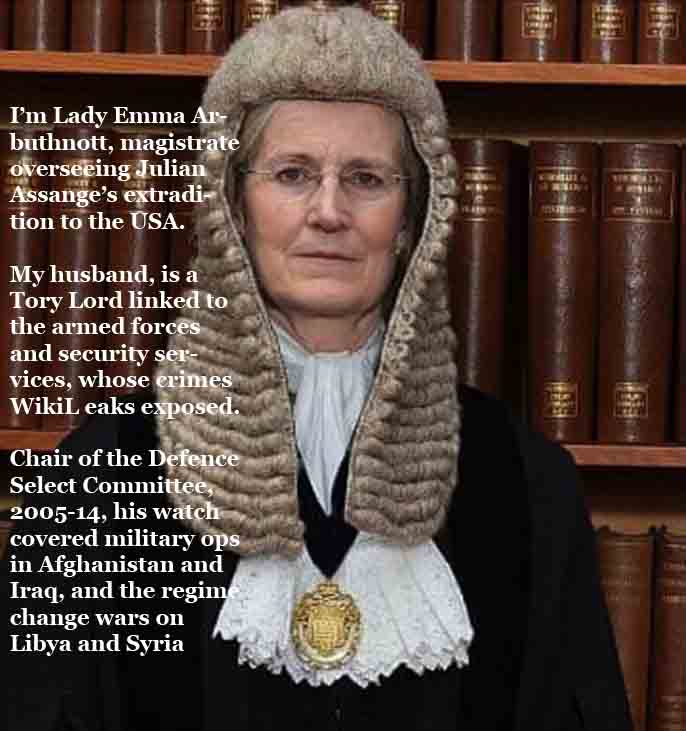
When, around six-thirty pm on March 27, I posted Maria Zhakarova’s tweeted response (below) to the Julian ruling, I knew her only through her media statements as Kremlin spokeswoman – she does not care for “spokesperson” – at the Foreign Ministry. In that capacity her forceful but never strident lucidity is impressive. But shortly after posting this I watched her give an hour long interview in a Moscow hotel with American alt-media journalist Jackson Hinkle, host of The Dive political talk show who’d already caught my attention by refusing to condemn Hamas. 1
Undated, other than that it took place this month – evidently before the Crocus atrocity on the 23rd, which gets no mention – it’s a fascinating sixty minutes. Impossible not to warm to this passionate, cultured, highly intelligent woman as she explores with Hinkle some of the gravest issues facing humanity – by way of Georgian cuisine .. John Lennon .. violent crime in Paris and Manhattan .. Crimea under the Nazis and its resonance today after Victoria Nuland’s coup and the Banderite resurgence it unleashed .. Arnold Schwarzenegger .. the fairy tale look of Moscow in white and ease of getting a Russian tourist visa. Leavened throughout by her humour, and a directness bordering at times on flirtatious, it’s rich with glimpses into a Russian soul the West has cancelled. Do watch if you can. 2
But back to Julian …
The High Court ruling this week, while not quite the end of the road, continues the torture of a man who, on ground of the scale and wickedness of what he exposed, can without hyperbole be deemed the greatest journalist alive. 3
Some say ever. For which he has paid a terrible price.
Fast forward to March 26, that interim ruling, and Mrs Zhakorova’s response on X-Twitter.
Today, the High Court of London issued an interim decision to postpone the extradition to the United States of the founder of the WikiLeaks portal, Australian investigative journalist Julian Assange.
Let’s do the maths together.
In November 2010, a Swedish court, at the insistence of the United States, issued an arrest warrant for Assange. Interpol immediately put him on the wanted list. This is the starting point, the conditional “zero”.
-
- In February 2011, a British court ordered Assange to be extradited to Sweden. Three months have passed since the first warrant was issued.
- In June 2012, the British Supreme Court upheld the decision to extradite Assange, the journalist took refuge in the Ecuadorian embassy. It’s been 18 months.
- In May 2017, Sweden terminated the investigation into the Assange case. At the same time, the London police said that Assange would still be arrested as soon as he left the embassy. It’s been 78 months.
- In April 2019, the London police, after exerting pressure on Quito, entered the territory of the Ecuadorian embassy and arrested Assange simultaneously on two requests – an American extradition request, which became the main one after the termination of the Swedish case, and a British arrest warrant. It’s been 101 months.
At the same time, it became known that the Australian faces an unthinkable 175 years in an American prison if the request for extradition to the United States is executed.
-
- In May 2019, hearings on Assange’s extradition to the United States began. It’s been 102 months.
- In September 2020, hearings on the merits began at the Central Criminal Court in London. A total of 118 months have passed. 17 months from the date of arrest.
- In January 2021, the Magistrates’ Court for the London Borough of Westminster refused to release Assange on bail. A total of 122 months have passed. 21 months from the moment of arrest.
- In December 2021, a London court approved Assange’s extradition to the United States. In total, 133 months have passed. He has been sentenced to 32 months since his arrest.
- In March 2022, the British Supreme Court rejected Assange’s appeal for extradition. A total of 136 months have passed. 35 months from arrest.
- In June 2022, British Home Secretary Priti Patel decided to extradite the founder of WikiLeaks to the United States. A total of 139 months have passed. He has been sentenced to 38 months since his arrest.
- In June 2023, the High Court of England and Wales rejected Assange’s appeal against the decision to extradite him. A total of 151 months have passed. 50 months from arrest.
And so, in March 2024, the High Court of London decided to postpone the extradition of the founder of WikiLeaks to the United States until the end of the appeal. A total of 161 months have passed. 60 months from arrest. It took 161 months – almost 5,000 days – more than 13 years for British justice to make a decision.
WAIT LONGER! Even if we count from the arrest, 60 months have passed, five years. Although, if you think so, I want to ask the question, what is the British? Did you study all the time when the Australian was sitting on the next street, in the Ecuadorian embassy? At the same time, as a result of pressure from London, he was in torture conditions – in a cramped room without access to the outside world and under round-the-clock surveillance by Scotland Yard.
The entire justice system of the Kingdom has turned into a farce – a laughing stock in front of the whole world. All this is a mockery of human dignity on the part of the monstrously ineffective, punitive British pseudo-justice.
It took London many years to make a criminal procedural decision against the journalist. On the other hand, London “knew everything” about the masterminds of the terrorist attack in Krasnogorsk a few hours later. On the dome of the Old Bailey, the central criminal court in London, there is a statue of Themis. With her eyes wide open, she looks to the West, towards America. Assange, who has dedicated his life to uncovering the secrets of the conglomerate of British and American intelligence services, becomes a victim of this corrupt British pseudo-Themis.

Once again, we would like to draw the attention of the international community to the Washington-inspired and ongoing persecution of the investigative journalist, which has been causing serious damage to the institution of journalism and independent media for many years, as well as trampling on the fundamental principles of freedom of speech and human rights.
*
Other good appraisals of this corrupt pseudo-Themis …

… can be read at Jonathan Cook’s site – Assange’s ‘reprieve’ is another lie – and at WSWS – UK High Court puts Assange on the brink of extradition …
.* * *
- Back in November, when propaganda blitz pressure to do so was immense – it still is of course – I posted on why you should not condemn Hamas.
- Early in the exchanges Maria Zhakarova asserts that Russia never had slavery. This may raise eyebrows when serfdom, which came very close, was not ended until Catherine the Great’s reign in the mid-19th century. (And doesn’t the name itself derive from Slavs sold by their fellows to Arab traders around the end of the first millennium?) But the context is that of why, despite Moscow’s diversity, skin colour lacks the toxicity it has in the West thanks to centuries of slavery and colonisation in the global south.
- As Jonathan Cook noted a while ago, US attempts to calm the stenography profession by claiming Julian Assange was not a real journalist hold no more water than the many other grounds – inter alia: FBI plot to kill him in London … FBI spycams at his Ecuador Embassy refuge (neither toilets nor meetings with lawyers excluded) … key witness Sigurdur Ingi Thordarson having lied on oath … clause in lopsided Anglo-US extradition treaty barring extradition of a political prisoner – on which the US case should have been laughed out of court. Journalism is not like law or medicine, which require formal qualifications and a licence to practice. You’re a journalist when you do journalism. Simples.

First of all, regarding Note 2 : Serfdom was not ended by Catherine the Great in the nineteenth century. She, in fact, reigned between 1762 and 1796 and reformed serfdom, rather than abolish it. It was Alexander II who emancipated the serfs in 1861, on the basis that it was better, for the likes of him, that they were “freed”, before they revolted.
Regarding the meat of Ms Zakharova’s interview, I think that her dislike of being designated as a “spokesperson” hints at how she regards herself which amounts to.an affirmation of biological sex over gender.
In other words, she offers a positive example of successful womanhood and female sexuality which is too often denied.I will probably be accused of over generalising, but, too often, I think, the successful woman is popularly portayed as mad, bad and dangerous to know. Think, for instance, of the femme fatales in the noire films of the 1940’s and 1950’s, a tradition which goes right back to Lady Macbeth and King Lear’s daughters. Also, think of how the colour red is used in the films of Michael Powell eg Black Narcissus, The Red shoes and Peeping Tom.. (Space prevents me from enlarging).
Maria Zhakarova strikes me as offering a direct refutation of this, or am I talking out my backside ?
I have no idea of the word count on here, but I feel bound to ask , “How is that most of the people that Philip Roddis characterises as “Gamekeepers turned poachers”, are American ? I am thinking, say of Ray McGovern, Larry Johnson and, above all, Scott Ritter. The interviewers of Vladymir Putin and Maria Zhakarova were both American. It is unthinkable that anyone from a major UK media institution would achieve anything similar. A key factor has to be the American liberal tradition, which was borne out of a colonial revolt, after all. Scott Ritter can write incisive accounts of say Gaza/Israel and the Crocus massacre which give accounts of causation while too many of the UK Left, such as it is, wallow around in a sort of liberal, relativistic pluralism which denies the elephant in the room which consists of the dominance created by American imperialism and finance capitalism. Of course such factors frequently exist as mediating forces various stages removed from the actual events, but that does not mean that they do not exist.
Wrong Catherine. My bad